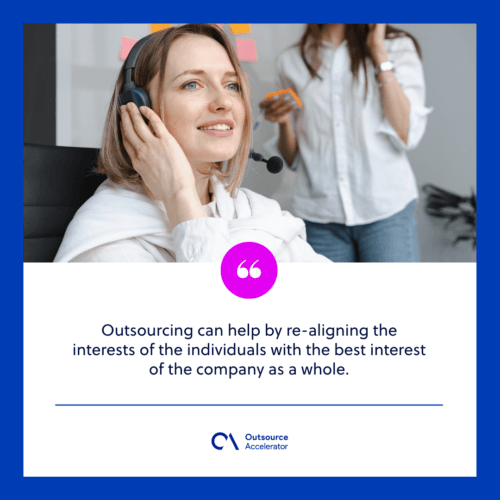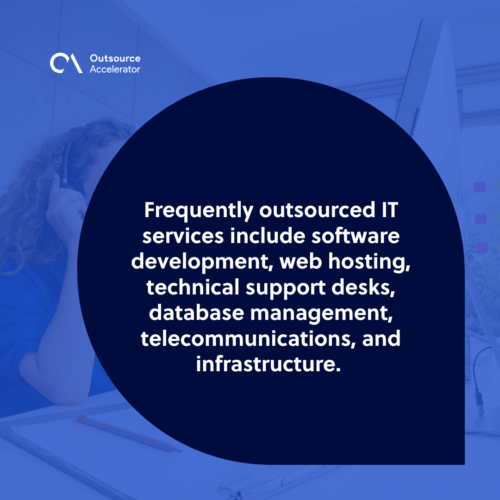Myths and misconceptions of outsourcing: Is it real or not?

- Myths and Misconceptions of Outsourcing: Is It Real or Not?
- Myth #1 - Outsourcing Lets You Lose Control of Your Business
- Myth #2 - Outsourcing Only Aims to Cut Your Operational Costs
- Myth #3 - Outsourcing Guarantees Lack of Knowledge on the Services
- Myth #4 - Outsourcing Is Only Limited to Big Businesses
- Myth #5 - Outsourcing Will Let You Lose the Privacy of the Company
- Myth #6 - Outsourcing Means Offshoring: There Is No Difference
- Myth #7 - Outsourcing Delivers Low-Quality Services and Outputs
- Myth #8 - Outsourcing Weakens the Economic Status of the Country
- Myth #9 - Outsourcing Adds Up to the Unemployment Rate
- Myth #10 - Outsourcing Is Not a Long-term Plan
- Myth #11: Outsourcing Is Only for Established Businesses
- Myth #12: IT Outsourcing Is Way Too Complicated for Small Businesses
- Myth #13: Healthcare BPOs Can Increase Expenses
- Myth #14: An In-house Sales Force is Cheaper Than Outsourcing
- Myth #15: Outsourcing Sales Force Destroys Company Branding
Many have heard of outsourcing, but many are also uninformed about it.
People judge outsourcing based on the myths they’ve heard from other people. Biased opinions generate more myths about how dangerous or unhealthy is outsourcing for a company.
A popular misconception about outsourcing is that it only aims to cut costs, and companies that aim for cost leadership are the only ones who avail of outsourcing services. If not explained, this misconception can affect a company’s outsourcing-based decisions.
Many companies are also scared of outsourcing because it reveals confidential information to third-party service providers. This myth will be discussed further.
But what exactly is outsourcing?
Outsourcing is a service that enables third-party service providers to perform a certain task for a client.
Letting third-party providers do the job creates a concern for most companies. Most companies worry about the quality of work that the outsourcing service providers would render.
Are the outputs aligned with the company’s goals? Does the third-party service provider provide high-quality outputs? Are the company’s data safe in the hands of the outsourcing service providers?
These are just several questions that will be answered later on in this article.
Aside from security and quality concerns, the biggest misconception about outsourcing is its limitations and scope.
Is outsourcing only limited to big businesses? Will the company lose its control when it outsources? Is outsourcing only limited to established businesses?
These questions can make or break decisions to outsource, and uninformed decision-makers might just miss out on opportunities.
Business process outsourcing (BPO), in particular, has also been clouded with myths and misconceptions. When people speak poorly of BPOs, they gather these biased and uninformed opinions about BPOs.
People easily believe in hearsay and naysayers. Those who speak negatively about BPOs tend to believe in unreliable sources that present biased and uninformed opinions.
Online sources are often the suspects behind this problem. There are many arguments about outsourcing that are posted online. Moreover, it’s better to consult with experts when it comes to outsourcing-based decision-making.
Amid the myths and misconceptions about BPOs, this industry still thrives and continues to grow and develop.
According to Statista, the global market share of outsourcing industries is valued at $0.37 trillion in 2024. By 2028, the industry could be valued at $0.44 trillion through a CAGR of 4.43%.
So fret no more. This article will debunk 15 myths and misconceptions that plague the image of BPO companies.
If these myths and misconceptions are left unanswered and unclarified, it could affect the future of business decision-making.
Myth #1 – Outsourcing lets you lose control of your business
Companies, big or small, would let third-party service providers perform specific business tasks – that’s how outsourcing works.
For example, a company might want to outsource accountants for their payroll or receivables.
When companies outsource accountants, these individuals would only work on the specific outsourced tasks – no more and no less. They are not given any significant authority for other matters not concerning the assigned tasks.
The principal focus here is significance. There are two questions that need to be answered.
- Do they have significant control over certain business aspects?
- Do they have a significant influence on the upper management?
If they do have significant control and influence, then maybe they are not BPOs at all. Companies hire BPOs to reduce the amount of non-value-added workload to the company.
Non-value-added activities are activities that do not bring up or enhance the quality of the company’s products and services.
Furthermore, non-value-added activities are also called “non-core activities.” Opposite to non-value-added activities are value-added activities. These activities give value to the product or service of the firm. Aside from that, value-added activities achieve the core goals of the firm.
To differentiate value-added from non-value-added ones, activities that add value to the company’s product or service should possess the following characteristics:
- Activity can cause a significant change in the product or service.
- Activity is not a rework activity. Thus, it is done right for the first time.
- Customers would pay for this activity.
To illustrate, assume that Arizona Electronics has an outsourcing agreement with New York Manufacturers, Inc. to manufacture and assemble one of its flagship smartphones.
New York Manufacturers will buy, process, assemble, and package Arizona’s products. Now, what are the value-added and non-value-added activities in the work provider?
First, the processing of direct materials is a value-added activity. Assembly and packaging are also necessary activities to bring the product to saleable condition.
These two activities are also value-added. But, some business processes are also necessary to keep the production line moving.
Below are examples of business processes that are not value-added but still necessary for operations:
- Processing a purchase order
- Using a storage facility
- Transferring finished goods
- Preparing a cost of production report
- Inspecting
- Quality checking
- Preparing client’s billables
Non-value-added activities are tasks that increase the cycle time, which is the total time needed to deliver the product or service to the end-user.
To increase the manufacturing or service cycle efficiency, companies should make an effort to reduce non-value-added activities, which, in return, would increase the value-added ratio. The manufacturing or service cycle efficiency is a measure of the ratio of value-added activities in a process.
To know the manufacturing or service cycle efficiency, the business should construct an initial process map and determine which process is value-added or not.
Next, determine the total cycle time by adding all the hours or days needed to complete a certain process. Then, add all the time needed to finish all value-added activities. Lastly, divide the total value-added time over the total cycle time.
Keeping non-value-added activities at minimal levels can help in reducing manufacturing or service costs.
However, letting outsourcing firms handle specific non-value-added activities can even help reduce costs and keep the production or service lines moving effectively.
Hiring full-time employees to work only for non-value-added activities can be a waste of resources and talents.
Companies hire BPOs mainly because they want more control over their employees. They want to harness the in-house talent that is stuck making payroll slips or managing uncollectible accounts.
If companies can hire outsourcing companies to perform non-value-added activities, then they can achieve full control of the business since the employees are fully engaged in activities that achieve the company’s mission, vision, goals, and objectives.
In fact, Deloitte’s Global Outsourcing Survey found that 78% of the respondents felt positive toward their outsourcing providers. This result indicates that the majority of companies who outsource are not suffocated by their outsourcing partner.

Myth #2 – Outsourcing only aims to cut your operational costs
In the previous myth, it was discussed that outsourcing could help companies control all their talents for the business’ growth. However, BPOs do not only handle tasks such as payroll, customer service, and whatnot.
Hiring BPOs can cut costs, but the cost advantage is not the only star of outsourcing. BPOs do business by performing services and providing talent.
Companies can hire BPOs for strategic purposes. For example, they can hire BPOs that offer crisis management that would help them in handling corporate issues or scandals.
Cost reduction is just one of the benefits of outsourcing. Cost reduction mainly aims at fixed costs.
For example, Arizona Electronics wants to improve its IT management and desires to use it to its advantage. Arizona hires an IT expert. The company will pay this IT expert around $50,000 at the least or even $90,000.
Aside from the IT expert, a team should be working in IT management, complete with facilities and tools. That would mean more fixed salaries expenses for the company.
On the other hand, if Arizona hires an outsourcing company, they’ll only pay a fraction of the cost they’ll incur from hiring new in-house employees.
Arizona would be assured that IT Solutions will provide the best employees to establish Arizona’s IT management. In other words, the client would receive top-quality service at a lesser cost.
Moreover, companies can also outsource financial consultants and management consultants. This outsourcing decision is a wise move if the company is expanding.
Remember that BPOs profit because of talent. If a specific BPO company can help its client in times of financial or management trouble, then the BPO’s credibility increases.
Thus, the cost advantage is not the primary driver of why outsourcing is popular. BPOs can offer more advantages other than cost reduction.
Deloitte’s survey found that companies are outsourcing mainly because of cutting costs (59%), focusing on business goals (57%), and solving capacity issues (47%).

Myth #3 – Outsourcing guarantees a lack of knowledge of the services
People who have experienced call center service often complain about the quality of the service they received, particularly the call center agent’s ability to address the callers’ concerns.
Customer service agents usually follow a certain protocol in handling customers’ concerns. This style becomes problematic when the client’s concern is not solved.
The call center agent’s reliance on formats only shows that they lack knowledge of the services they represent, and this issue creates a negative image of outsourcing in general.
Whether it’s a call center service provider or an IT service provider, most businesses are questioning the ability of BPO companies to perform services on their behalf.
Starting a BPO company is not easy. Some may think that one can start an outsourcing firm by gathering individuals who could do a specific task.
However, outsourcing is way more profound than that. Outsourcing is not just a performance of services. It is about performance backed with experience and expertise.
Outsourcing companies do business by acquiring a deep understanding of their services and offering them to companies that need them.
The core of outsourcing is the dedication to its services and customers. The objective of outsourcing for this matter is to do the job right at the best quality.
Through this objective, BPOs commit to continuous development and learning. If their knowledge is outdated, they would be entering a battlefield with sticks and stones against tanks and rifles.
In Deloitte’s 2016 survey, over 50% of the respondents found out that “third-party advisors added value during strategic assessment, business case development, RFP / vendor selection, and negotiation and contracting.”

Myth #4 – Outsourcing is only limited to big businesses
Although outsourcing companies are more attracted to bigger clients, they are not closing their doors to small businesses. Small and medium-sized entities (SMEs) are the top customers of BPOs.
Because of the cost savings that SMEs can get from BPO services, the outsourcing industry chooses no size. SMEs are growing companies.
BPOs tend to choose SMEs with potential. Why? It’s because they want to become long-term service providers for these growing companies.
In fact, 27 percent of companies who outsource have one to less than five billion annual revenues, according to Deloitte.
The results of the survey also showed that 23% of companies who outsource have 25 million in annual revenues. This fraction indicates that big entities and SMEs play a role in the outsourcing industry.

Myth #5 – Outsourcing will let you lose the privacy of the company
Outsourcing articles mention privacy breaches when discussing outsourcing.
At first glance, many would assume that BPOs can see through the company’s true image. It may sound scary, but this is the fear why most companies think outsourcing is a privacy breach.
In business relationships, trust is the key to a successful and long-lasting relationship. BPOs operate by earning the trust of their clients, which can then be earned through honesty and integrity.
BPOs want the trust of their clients to be strong and firm. Companies are at risk when exposing financial information to BPOs, and this is a reality that cannot be avoided.
Firms need to find the right outsourcing work provider to reduce the risk and worry of giving confidential information.
Moreover, it is the BPOs’ responsibility to use this information for the client’s best interest. The security and safety of a company’s data is the top priority of BPOs.
If they mismanage their clients’ data, companies will lose confidence in the BPO industry, and they will be eradicated in the business arena.
Of course, BPOs aim for a going concern. The competition among BPOs now is privacy protection. Companies shouldn’t worry about this as long they choose the right outsourcing company for them.
According to Deloitte’s 2016 survey, only 23% of the respondents said that cybersecurity risks affect their outsourcing decisions. This result shows that more companies trust their outsourcing providers to keep their information safe.

Myth #6 – Outsourcing means offshoring (there is no difference)
Outsourcing and offshoring are two different teams. They’re not even related at all.
As defined, outsourcing is an agreement between a client and a third-party service provider wherein the latter will provide services to the client.
Business offshoring is just getting a job done in a different country, but the employees are still part of the firm.
Offshoring becomes a cost advantage since some countries have lower wage rates and tax rates compared to the company’s home country. Access to lower wage and tax rates is one of the advantages of offshoring.
Don’t be fooled. Companies could still hire BPOs from other countries. For example, businesses in the United States can hire BPOs in the Philippines and India for customer service jobs. Now you might say, “That sounds like offshoring for me.”
Identifying the status of the party providing the service is the focus in determining whether it is outsourcing or offshoring. Here’s a guide to help you understand.
STEP 1: Does the company elect other entities to perform a specific business task?
IF YES, STEP 2: Is the entity located in another country?
IF YES/NO, STEP 3: Is the entity a subsidiary or a partner company?
IF YES, Then, it is offshoring.
IF NO, Then, it is outsourcing.
Although outsourcing and offshoring are two different things, there is a thing called “offshore outsourcing.” It is a hybrid of outsourcing and offshoring, and it relatively combines the benefits of the two.
Offshore outsourcing is hiring a third-party service provider from another country to perform services for the company. Thus, it is guaranteed that the service is done in a foreign country and that the service provider is a third party.
To sum it up, offshoring and outsourcing are not the same. The two share characteristics only when combined through offshore outsourcing.
The defining point between offshoring and outsourcing is the status of the service provider.

Myth #7 – Outsourcing delivers low-quality services and outputs
The main focus and objective of outsourcing are ensuring the quality and integrity of their outputs to clients. To illustrate, take, for example, an accounting firm. One of the service areas of an accounting firm is financial statement (FS) preparation.
Publicly listed companies need outsourced financial accountants to prepare their financial statements. These organizations are listed on the stock exchange, and with that kind of status, they have public liability to stockholders.
Since some stockholders don’t get involved in the internal operations of the company, FS is the only way that they can assess if the company is doing well. Aside from that, future investors also use FS for financial analysis.
Since a lot is at stake, accounting firms need to send the cream of the crop. These financial accountants are experts in FS preparation. They are updated with financial standards, particularly IFRS for most countries and GAAP for the United States.
With this knowledge and talent outsourced, companies are assured that their FS is prepared carefully and correctly. Should the accounting firms deliver low-quality outputs, their credibility would go down.
Deloitte’s 2016 survey compared data from 2014 and 2016. Survey results found that concern about poor service quality plummeted to 20 percent.
The 2014 data showed that 48% of the respondents reported poor service quality. This significant decrease shows that outsourcing industries are now improving and innovating.
However, a hasty generalization that outsourcing delivers subpar services and outputs is fallacious on all counts. The best way to reduce the risk of getting low-quality output is to choose the best outsourcing service provider among the rest.

Myth #8 – Outsourcing weakens the economic status of the country
Uninformed individuals say that outsourcing is nothing but a killer to the economy.
That viewpoint is fragmented and biased. From an economist’s point of view, outsourcing strengthens the economic status of a country.
Recall that outsourcing is a cost advantage for companies. Aside from that, companies can refocus in-house talents to work on the important goals that would lead to the company’s growth and development.
Combining cost advantage and refocusing company talents, this combination increases productivity and efficiency.
Productive and efficient companies provide better goods and services to the market. As a result, the effect of better goods and services is a healthy market, wherein goods and services are offered at better prices without sacrificing profit goals.
A healthy market gives birth to more investments and employment. If companies are improving, the country can ensure the long-term existence of companies.
Thanks to outsourcing, the longevity of businesses secures more tax revenues and employment opportunities for skilled individuals.

Myth #9 – Outsourcing adds up to the unemployment rate
The driving force behind this myth is that jobs are lost when a company outsources jobs, especially if it is an offshore outsourcing.
Unemployment in the United States dropped. Jobless claims are now 10% lower than the 25-year average. Statista presented that annual unemployment in the United States is at 4.4%.
The household survey in the United States also found out that there are 2.2 million Americans who are employed compared to during the recession.
If outsourcing creates unemployment domestically, how come unemployment rates are lower? In fact, outsourcing helps a company expand. When companies expand, more jobs are created. Cutting costs through outsourcing makes a company expansion possible.
However, outsourcing does not immediately equate to offshoring. There is this branch called “onshore outsourcing.” For example, U.S. companies can use onshore outsourcing by hiring BPOs in the United States.

Myth #10 – Outsourcing is not a long-term plan
People think outsourcing is for the short-term only because they look at outsourced tasks that are non-value-added.
As a recall, outsourcing companies also offer strategic services such as financial consultancy, supply chain services, and enterprise resources planning, to mention a few.
BPOs want long-term clients. Long-term clients secure a long-term source of revenue and cash flow. From the clients’ perspective, companies should go for long-term contracts with BPOs. Through long-term agreements, BPOs can fully understand the company’s structure.
By learning the client’s business goals, strategies, and vision, BPOs can come up with solutions that are aligned with the client’s ideas.
However, BPOs are trained to offer business solutions that are aligned with the client’s wants. Through a long-term agreement, these business solutions will be more accurate and more reflective of the client’s ideas.
Entering into a long-term partnership with BPOs can enhance the quality of outsourced services that both parties would gain.

Myth #11: Outsourcing is only for established businesses
A common myth in outsourcing is that only the “big guys” can use it. That might sound true at first, but that’s absurd.
The target market of outsourcing does not depend on the business’s existence. Whether the business is starting or not, outsourcing is not biased in this matter.
In fact, small businesses are in need of outsourcing companies. BPOs can provide consultancy, advisory, and other services to keep the business growing.
The main challenge for small businesses is longevity. Most business failures are due to mismanagement, complacency, fraud, and decreasing customer loyalty.
BPOs can offer solutions for that. These solutions are not just for a short-term plan but also the long-term.
For mismanagement, outsourcing companies can send management experts to evaluate the business plan and offer solutions to keep it viable. Common mismanagement problems are due to agency problems.
Agency problems arise when there is a conflict of interest in the management, particularly in the key personalities running the firm.
When agency problems arise, there will be agency costs. These agency costs damage the business as a whole.
In an agency problem, there is a conflict between increasing shareholders’ wealth and managers’ wealth. When such problems start to develop, the interest of the business as a whole – which refers to the cooperative effort between shareholders and management – is not followed.
Outsourcing can help by re-aligning the interests of the individuals with the best interest of the company as a whole. Financial and management advisors can help assess the company’s problems. This scenario shows why outsourcing is helpful.
If you examine, hiring third-party advisors and consultants promotes integrity and neutrality. In this manner, the third-party advisor can fully assess the status of the organization and propose solutions that would be in everyone’s best interest.
Outsourcing can help startup business identify their market properly. Backed by experience from other clients, BPOs can help startup businesses create a viable and feasible marketing plan that matches their capability as a startup.
Since BPOs are designed for services such as marketing, a startup business need not worry about everything. BPOs do their job while the owner keeps the business running smoothly.
Outsourcing can be the key for most companies to be established. Startup businesses are still learning and experiencing almost everything.
For example, startup businesses are still learning how to control costs, especially how they could achieve their breakeven point in the first months of operations. The learning and application of management principles take time.
Outsourcing companies can help these businesses make better decisions, improve processes, and secure a future for their products or services. A startup business’s goal is to continue operating the business in an ongoing concern.
Third-party experts guide startup management based on client experience and business expertise. With advisors and consultants, the startup business can learn from them and soon stand on its own.
Lastly, most startup businesses need to maintain strong finances and internal control. Hiring accountants from accounting firms can help design a fraud-resistant accounting system.
As a startup business, employees who steal money from the company are not good. Having strong and firm internal control procedures can help startup businesses protect their financial resources from theft or fraud.

Myth #12: IT outsourcing is way too complicated for small businesses
Deloitte’s 2016 survey showed that 72% of the respondents answered that they currently outsource IT. This information shows that IT is evolving and that there is a need.
In the age of the internet and communication, businesses can access data from any part of the globe. Businesses can transfer tons of data from point A to B in less than an hour. With this kind of technology, many businesses can see its potential in improving business processes.
Small businesses, unfortunately, are often disregarded when talking about IT applications. Though big or small, every business has its own data needs.
Small businesses are still growing and in need of careful monitoring. IT applications can help simplify complicated business processes.
Small businesses can start by using bookkeeping software or spreadsheet programs. Also, they can have their own program specifically designed for the needs of the business. This is the reason why IT outsourcing is also important for small businesses.
Small, medium, or large businesses need IT outsourcing. Size is not the question here.
IT outsourcing companies do business by knowing the company’s needs and building an IT infrastructure for those needs.
With an IT system built for the business, work efficiency and effectiveness are expected to increase. Accuracy and security of information are also assured.
Frequently outsourced IT services include:
- Software development
- Web hosting
- Technical support desks
- Database management
- Telecommunications
- Infrastructure
These services are vital for companies, whether they are big or small.
For example, small businesses can reduce fixed-salary expenses if they hire IT outsourcing companies for a technical support team. On-the-line or on-call tech support means that companies only pay for the services they use.
Compared to having an IT specialist on the roster, businesses may find themselves paying $90,000 and not getting the results they want.
Aside from that, businesses can save from employee benefits given to in-house IT specialists. They don’t have to worry about the unavailability of the employee in times of need.
Tech support is usually available 24/7, and the business can ensure full-time help from outsourcing.
Outsourced IT specialists can also create a transaction processing system (TPS) to reduce manual intervention in transactions.
An in-house IT team working for a TPS is expensive. It is better to have them outsourced from outsourcing companies that have been known to have helped other businesses improve their processes.
Small businesses need all the cost-saving techniques on their deck. IT solutions are one way to mitigate costs. Consulting IT firms and choosing the best IT firm can help small businesses build their road to growth.

Myth #13: Healthcare BPOs can increase expenses
The healthcare sector is one of the most important sectors of society, dealing with medical and health services.
Hospitals and medical facilities treat many patients on a daily basis. The main function of a hospital or a medical facility is to provide healthcare and hospitalization services.
However, there are many other hospital functions. One critical function is revenue cycle management (RCM). Hospitals must immediately provide healthcare services to individuals who need medical help. This system creates a problem for hospitals.
How can they keep track of these patients?
RCM focuses on the financial aspect – in short, keeping track of the medical billings of patients. While doctors and nurses do their jobs in keeping the patients healthy, the RCM ensures that all services or products used are accounted for and billed to the patient.
An RCM system utilizes medical billing software to keep track of billings and usage of facilities available to the patient. It is no joke that hospitals grow at a faster rate compared to other service businesses.
As hospitals grow, the management might lose control of the management functions, which may cause a decline in cash flows. But, having a competent RCM should make things better.
Below are the reasons why outsourcing RCM is a good step for a healthcare provider:
1. Constant changes in regulations
RCMs communicate with insurance companies to access the patient’s healthcare benefits. Since changes in insurance policies equate to changes in transaction treatments, in-house management of RCM would feel the full impact.
Employees will have more workloads on their desks. Hospitals would be responsible for the in-house training of staff to update them on recent developments.
However, if RCMs are outsourced, companies can keep up with these changes. There is no need for internal training, and hospitals can rest assured that their revenue is handled properly.
A recent accounting standard for revenue recognition has been made effective starting January 1, 2018. This new revenue standard is IFRS 15 Revenue Recognition. This new standard changes the way how revenue is recognized.
In-house staff would undergo training and seminars to learn about this standard. This would mean more costs for training, but the right outsourcing partner can make sure that their employees are updated ahead of time.
2. Reduction of clerical errors in revenue recognition
Errors may be material or not, but every cent is important. Having an in-house RCM team can make employees stressed, thus causing them to commit more errors.
Since in-house RCM is costly, most hospitals would hire only a few to handle the tasks. But soon, workloads will pile up.
Having an RCM outsourced can help in reducing errors in revenue recognition. Also, outsourced RCM can ensure that revenue is accurate.
3. Cost-cutting is inevitable
Whether the hospital cuts operational costs or lays off employees, poor revenue measurement and collection affects the profit margin of the company. Having an efficient RCM can help in measuring and tracking revenues as it is earned.
With improved revenue collection, income figures will reflect the true performance of the business. Perhaps, a low-income figure is a result of poor revenue measurement.
Having professional RCM managers outsourced can help in reducing costs and improving the accuracy of revenues.

Myth #14: An in-house sales force is cheaper than outsourcing
An in-house sales force is way deeper than the false assumption that it is cheaper than outsourcing a sales force.
The truth is that an in-house sales force is not cheap at all. If a sales force is established internally, this means that the company would hire full-time employees to work on the marketing plan.
It sounds good, but the costs attached to that do not figure. First, the company would pay an average of $70,000 per year- that’s just the basic salary. There will be employee benefits involved.
Vacations, holidays, and sick pay also add to the cost of an internal sales force. Roughly, that would reach $90,000 per year, and that’s just a large amount of money.
Entry-level marketing graduates are inexpensive to hire as well as inexperienced. On the contrary, professional marketers are experienced but expensive. The buy-or-build decision in this depends on the business’ ability to finance.
However, the benefits that companies would receive from an insourced sales force versus an outsourced sales force are relatively the same, considering that the people in the sales force are competent and experts.
But, the price difference is the ultimate deciding factor.
Outsourcing labor, such as a sales force, grants the company access to a wide range of marketing solutions. Outsourced teams offering marketing assistance are backed by experience and knowledge in preparing marketing plans and implementing them.
Aside from that, an outsourced sales force can work faster since the company has a competitive knowledge base that could help the sales force make better solutions. An in-house sales force may have a difficult time gathering information.

Myth #15: Outsourcing sales force destroys company branding
People say, “Only you can sell your product better.” However, that’s not the case at all times.
Even though the product or service is irrefutably marketable, having a sales force build the product’s brand can sustain the product in the market.
A marketing mix is vital for product or service branding. The four Ps of a marketing mix are Product, Place, Price, and Promotion.
An outsourced sales force can help develop a better product for the market. The leverage that outsourcers have is their knowledge base.
Outsourcing can help in establishing a well-crafted marketing plan. This plan starts with the selling proposition. Outsourcing companies must have data from past customer surveys. This knowledge acquired from previous clients can help in forming better marketing solutions.
Understanding competition and customers relies heavily on data. An in-house marketing team would be spending more time conducting surveys, interviews, and research.
However, service providers are made available of acquired knowledge and experience in outsourcing companies.
Outsourced personnel can consult experts in their company. This knowledge cannot be easily achieved internally. It would take years before an organization can establish a knowledge base in marketing and sales.
The sales force is tasked to solve marketing problems. Competitors will always be the number one hindrance to similar products and services.
With the experience BPO companies have, short-term and long-term solutions can be implemented to ensure that the product or service remains competitive.
Branding is a shared effort between the client and the service provider. An outsourced sales force is present to translate the message the client wants to tell the customer through its products and services.
The bottom line is choosing the best outsourcing business. Companies should choose an outsourcing partner that has been a leader in marketing and promotion.
However, an in-house sales force is not discouraged. Startup companies are encouraged to avail sales and marketing outsourcing services so that they can be guided properly.
Established companies with established brands can also hire sales and marketing providers. Outsourcing can be useful for every company, not just for the established ones.
Outsourcing has become a major player in the growth and development of most companies worldwide, but myths and misconceptions plagued the image of outsourcing.
It has its strengths and weaknesses. However, those who want to outsource should use outsourcing services to their advantage.
One thing that companies should remember is that outsourcing is a choice. It is not inevitable. Companies should make a cost-benefit analysis before engaging in outsourcing or hiring a third-party advisory. However, in these changing times, one challenge remains.
Outsourcing partners should innovate to offer better services for their clients.
In the next section, we will tell you the stories of some of the most popular entrepreneurs and companies about how they used outsourcing as a stepping stone to success.








 Independent
Independent




